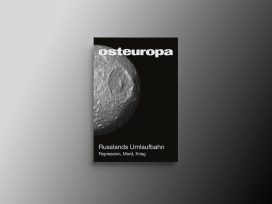Abstracts Osteuropa 8/2006
Dorothea Redepenning
Chronicler of his times. Dmitrii Shostakovich in the conflict between ethics and aesthetics
No other twentieth-century composer was interpreted so frequently in terms of politics as Dmitrii Shostakovich. All too often, however, he is measured exclusively in terms of extramusical criteria. This approach is problematic. Shostakovich may have made the role of chronicler his own, but he preserved truth and moral integrity. As analysis of the middle symphonies shows, however, there are connotations rooted primarily in musical traditions that point to the conflict between ethics and aesthetics, the realm in which Shostakovich moved.
David Fanning
Reluctant revolutionary? Dmitrii Shostakovich on the occasion of his 100th birthday
Interest in Dmitrii Shostakovich has exploded in the year marking his hundredth birthday. At
the same time, it is still difficult to answer several key questions concerning his life and his
work. What is it about his music that makes it so popular with concertgoers today? “Empty
bombast” or “ironic genius”: Why does his music provoke such different responses? To what
extent was his musical style shaped by the Soviet communist regime? Are the “memoirs” genuine? The answers should take into consideration the range of Shostakovich’s artistic gifts and the role of performance in conveying musical meaning and by all means avoid reading narrowly political attitudes into his work.
Kerstin Holm
What is horrible is the start of something beautiful. What Dmitrii Shostakovich means to Russia today
Dmitrii Shostakovich’s stature as a major composer of the twentieth century also makes him a burden for his homeland: The new generation of composers have to commit cultural patricide in order to find themselves, says St Petersburg native Boris Filanovskii. Shostakovich’s music of the Stalin era, marked by its flaws in musical grammar, becomes a full-fledged cultural monument of its epoch for this very reason. For those freedom lovers struggling to come to terms with the past, it is not the most welcome finding.
Leonid Gakkel’
The law of complements. Shostakovich and Prokof’ev
Prokof’ev and Shostakovich did not have anything to say to one another, and neither could listen to the music of the other. The entire essence of Prokof’ev ran counter to Shostakovich aesthetically and structurally. Nonetheless, there were points of contact. Prokof’ev and Shostakovich belong together as do the material and spiritual world. In the case of these two composers, the same approach should therefore be taken as with Goethe and Schiller: Instead of arguing over who is better and more important, one should be happy that Germany has two great poets.
Bernd Feuchtner
Songs of night, nights in fear. Fear in the music of Dmitrii Shostakovich
In the Stalin era, the privilege of expressing the things that could not be said fell to music.
Dmitrii Shostakovich developed a virtual system of hidden meanings, something that gave his
music a false bottom, which only those who felt the same and understood this language could see through. He gave expression to the fears that inflicted an entire epoch – fears that appeared at night in particular.
Andreas Wehrmeyer
“It seems that I myself am a Jew”. On the “Jewish element” in the work of Shostakovich
To the extent that there exists an inclination to suspect the music of Dmitrii Shostakovich categorically of being potentially critical of the Soviet regime, is allegedly inferred without difficulty by the use of Jewish musical idioms: an expression of identification with the fate of the Jews, code for repression. In fact, the circumstances are more complicated. Such concrete
meanings are hardly clear and can only be imagined by the listeners.
Jascha Nemtsov
“Death circles around me”. Shostakovich’s sonata for violin and piano
In recent decades, hardly any other important work by Dmitrii Shostakovich has led such a
shadowy existence as his Sonata for Violin and Piano op. 134 from 1968. It appears to critics as “less successful”; performers brand it as “ungrateful” and “unwieldy”. With that, this composition is fundamentally unrecognized. The musical world of this sonata reflects Shostakovich’s attempt to come to terms with the issue of death. In the process, 12-tone series found their way into the composition. However, they are but one element of this portrait of death depicted in sound, which Shostakovich developed in his later work.
Levon Hakobian
“I never loved you, you gods!” Shostakovich and proletarian music
Shostakovich’s contacts to proletarian music of the 1920s are expressed in the 2nd Symphony
for the tenth anniversary of the October Revolution. His disparaging remarks regarding “easy”
music are also in tune with the ideology of the cult of the proletariat. At the same time, he
despised the music of proletarian composers and was relieved, when, in 1932, their union
RAMP was disbanded. Twenty-five years later, he again turned to the aesthetic of “proletarian” music in the 11th Symphony. In addition, he worked on two choral works by the leading “proletarian” composer, Aleksandr Davidenko. Presumably, the interest the mature Shostakovich showed for this music from which he had distanced himself earlier is a re-evaluation of ideological values typical for many intellectuals during the Thaw under Nikita Khrushchev.
Wolfgang Mende
“A living weapon in combat”. Shostakovich and the cultural revolution
Dmitrii Shostakovich is considered by many today as a camouflaged dissident. For the years
1928 to 1931-32, this is not a convincing argument. Through his compositions for ballet, concert hall, theatre, and film as well as his public remarks, he to a large extent supported the
political and social goals of the cultural revolution during this phase of his life. Measured
against the backdrop of Shostakovich’s reception at the time, analysis of the ballet “The Bolt”
(1930-31) shows that the legitimation of political violence presented in the plot is not disavowed by the entertaining and satirical character of the music but is instead largely promoted.
Stefan Weiss
1948 without end. Shostakovich as stage hero
Shostakovich’s relationship to Stalin, which was full conflict, has inspired authors living in different eras and regions to write plays about this topic. The play “Il’ya Golovin” by Sergei Mikhalkov (1949) and “Master Class” by David Pownall (1981) as well as the opera “Dmitrii, or The Artist and Power” by Hans-Klaus Jungheinrich and Luca Lombardi (2000) work through personal and contemporary history in very different ways and convey at the same time information about Shostakovich’s reception in their respective context of the creation process.
Svetlana Savenko
Fruitful tension. Shostakovich and Igor’ Stravinskii
Shostakovich and Stravinskii are generally considered representatives of fully contrary musical views. The relationship between the composers, however, is more complex than it appears at first glance. Shostakovich attentively followed the work of his older colleague and admired him as a musician – although not as a thinker. Conversely, Stravinskii’s ambivalent attitude towards Shostakovich gave way to an increasingly harsh criticism of Shostakovich as a Soviet “state composer” and of his “primitive” aesthetics.
Dorothea Redepenning
Offences, abysses, absurdities. Questionable books about Shostakovich
Dmitrii Shostakovich’s work not only inspires musical interpretations. On the book market,
there are new publications about the man and his work. Not all of these are guaranteed to advance our knowledge. Almost twenty years of debates over the authenticity of the “memoirs” published by Solomon Volkov are left unmentioned in the new German edition. Volkov’s new monograph about Stalin and Shostakovich is a methodological and musicological offence. Academia nonetheless continues to turn out works that pretend to address, say, the grotesque in Shostakovich’s work, but that are instead grotesque in their craftsmanship and in their own understanding of scholarship.
Published 30 August 2006
Original in German
Contributed by Osteuropa © Osteuropa
PDF/PRINTNewsletter
Subscribe to know what’s worth thinking about.



